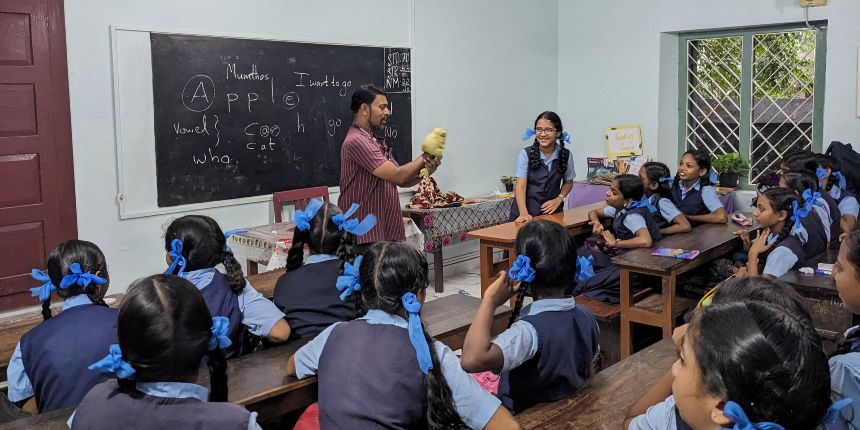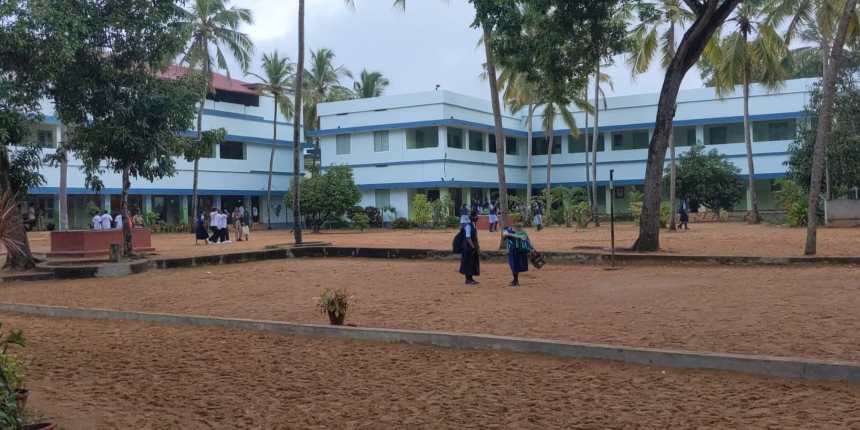Kerala is preventing fishermen’s children from dropping out with music, sports, art classes
Atul Krishna | August 16, 2024 | 01:09 PM IST | 5 mins read
Samagra Shiksha Kerala’s ‘Beach-to-Bench’ programme aims to strengthen the bond between children and schools, counter belief that ‘mother sea’ will provide everything.

THIRUVANANTHAPURAM: Irfana, a Class 7 student at St. Philomena's Girls High School, is left awkwardly giggling as Felix Joffrey animatedly asks her how she is doing through a sock puppet and 29 of her classmates watch. This communicative English class that Joffrey teaches is one of the four ‘special classes’ that Irfana and friends, all hailing from impoverished coastal communities in Poonthura, Thiruvananthapuram, look forward to every week.
The other classes introduce students to musical instruments such as keyboards and violins, arts and craft, and even sports, such as football, volleyball, badminton and chess. Students from Classes 1 to 10 are encouraged to sing, dance, take up art projects, play sports and be puppeteers.
These classes are part of the ‘Beach to Bench’ programme launched by Samagra Shiksha Kerala (SSK), the government agency responsible for universalising school education in the state, as part of a wider national effort. SSK coordinators like Joffrey conduct the special classes in schools located in four coastal areas in Thiruvananthapuram district and one in Malappuram.
The aim of the programme is two-fold: to identify and develop the academic, cultural and sports skills of students, and to prevent dropouts by identifying vulnerable students in the school system and strengthening their links with schools.
It does it through activities that make school and learning enjoyable. It supports vulnerable students academically through classes that focus on foundational literacy and numeracy and also raises awareness among parents. Irfana’s school, St. Philomena's Girls High School, Poonthura, a private-aided institution, was among the first to pilot this project in the state in March 2023.
In July, Kerala general education minister V Sivankutty said that the scheme will be expanded to all nine coastal districts of the state.
Samagra Shiksha Kerala project
Children from the coastal districts of Kerala tend to be some of the most vulnerable in a state that is otherwise advanced in literacy and education. While fishermen communities are constantly plagued by fear of tsunamis, cyclones and other calamities, many rely on it entirely, harbouring a singular apathy toward education and the possibility of a future outside of fishing.
“In these communities, they believe that even if you don’t study, the ‘mother sea’ will give them everything. So, for them education is not as important. But even then, there are many in this generation who are not as keen on sending their children to the sea. But for them, there are no opportunities anywhere,” said Joffrey.
That’s where the programme comes in. The school selects 30 from students enrolled across classes, based on their academic performance, social background and whether they are vulnerable to dropping out. Then the SSK conducts a basic foundational literacy and numeracy test to identify students who are lagging behind in academics. These students are then given activities that aim to improve their reading, writing and numeracy skills.
The programme is for Classes 1 to 10 but the school takes a call on which classes to include. At St. Philomena’s, it is for Classes 6-8. One-hour classes are held every Monday, Wednesday, and Friday; on Saturday, when the rest of the school is off, there is a 3-hour session.
 Beach-to-Bench programme identifies and supports vulnerable students in coastal areas (Image: Atul Krishna)
Beach-to-Bench programme identifies and supports vulnerable students in coastal areas (Image: Atul Krishna)
“Students from these areas are very intelligent but get left behind due to social circumstances. Under SSK, we have formed learning centres to provide academic support. This also involves ensuring parents’ support in school because mostly what happens is that the students have no support and hence they stop going to schools,” said Sreekumar S, district project officer at SSK.
SSK: Bond with schools with music, sports
Apart from sports and music, students are also introduced to topics such as sustainable development and hygiene.
SSK coordinators believe that the unconventional method of teaching-learning is what makes the programme unique. Students are getting to play violins and keyboards for the first time.
“Students are very involved as these musical instruments are not available to them. They can play with things that they otherwise are not even able to touch. Football, badminton, volleyball, chess training are also imparted among the students. They seem to show more interest in playing football than in some of the academic activities. So much so that, children who are not even part of the programme, also ask us if they can join,” said Diana RM, a cluster coordinator.
These classes help make school attractive to students as it is no longer just a teaching-learning, exam-taking enterprise. Moreover, the classes serve as safe spaces for girls to learn and play after school and on weekends.
SSK Kerala: Identifying skills, academic support
The programme also helps teachers identify and develop the aptitude of students while also supporting students who are not performing well in academics. For the last part, there are education volunteers, appointed by SSK to help strengthen the foundational literacy and numeracy of students.
“If someone is weak in these fundamentals, we give them extra classes to help them perform better. We help them revise what has been taught in the class on that day. We have seen some positive results overall,” said Sreeja BU, education volunteer for SSK. Children have also built confidence, overcoming “stage fright”, she said.
“It is about identifying their skills. One student might be good at communicating, another would be good at singing,” said Joffrey. “There have been instances where we could identify a student’s talent just because they were in this programme.”
Parents’ support
The programme also looks at linking parents with schools and addressing their apathy towards education. As part of the Beach-to -Bench programme, SSK has also conducted vocational skill workshops for the parents.
“We have also held soap-making sessions and lotion-making sessions for the parents of these students. This helps them generate additional income,” said Diana.
It also helps them create a positive association with the school, encouraging them to send their children.
“For higher secondary students, we sometimes ask them to prepare diaries and get their parents signatures because it is also important for the parents to be involved and aware about the academic performance of their children,” said Sreeja.
Follow us for the latest education news on colleges and universities, admission, courses, exams, research, education policies, study abroad and more..
To get in touch, write to us at news@careers360.com.
Next Story
]‘Creamy layer’ rule will make Dalit, Adivasi teachers more scarce; deal a blow to diversity: Manoj Mitta
The advisory on ‘creamy layer’ in the Supreme Court judgment on SC ST reservation allowing sub-classification of Scheduled Castes is non-binding but it could encourage some states to extend the creamy layer filter beyond the OBC quota.
Atul Krishna